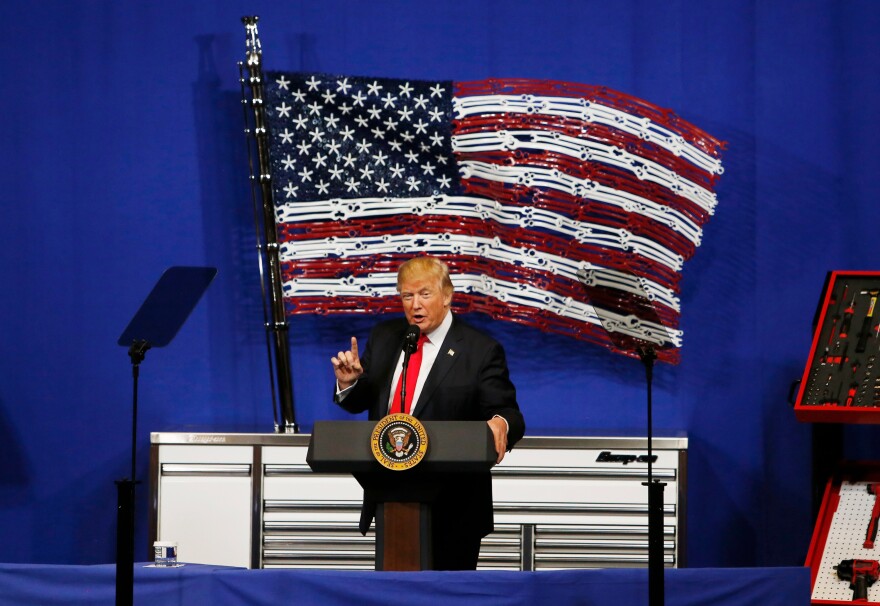Updated at 4:05 p.m. ET
This is what a president can do with the bully pulpit:
It's Tax Day. And that means another reminder of the fact that President Trump has broken with tradition and not released his tax returns.
That would be a big focus of the day except that Trump, like other presidents before him, is trying to drive the narrative with something he is more comfortable with — he held an event in Wisconsin at a tool company headquarters to discuss his "Buy American and Hire American" executive order released Monday night.
It's a nice, simple slogan that helps him look like he is delivering on a campaign promise. And it helps deflect from an otherwise negative storyline.
Reality, however, is not so neat.
"Buy American": more complicated than it sounds
The executive order calls for a review of existing laws and strengthening a visa program that some believe is being abused and undercutting American workers in some instances.
But heads of technology companies warn that cracking down on the H-1B visa program, for example, could actually have the unintended consequence of more companies shifting jobs overseas.
"The effect would end up being exactly the opposite of what Trump wants," Robert D. Atkinson, president of the Information Technology and Innovation Foundation, argued to the New York Times. His group is funded by technology companies. "Companies would go offshore, like Microsoft did with Vancouver, Canada."
Trump's "Buy American" policies would also likely mean more expensive construction projects, as NPR's David Schaper reported before the president's address to a joint session of Congress earlier this year:
"[P]reserving American steel industry jobs comes at a cost. 'Economics is always about trade-offs,' says Jeff Davis, senior fellow at the Eno Center for Transportation, a nonpartisan policy think tank in Washington, D.C., who has written extensively about 'buy America' rules. 'Domestic-made steel usually out of the mill will cost 70, 80 percent more than Chinese steel out of the mill,' Davis says."
It's also not clear how far the "Buy American" policies go. During that address to Congress, Trump said the following:
"We have cleared the way for the construction of the Keystone and Dakota Access pipelines, thereby creating tens of thousands of jobs. And I've issued a new directive that new American pipelines be made with American steel."
That would seem to imply that the Keystone XL pipeline would have to use American steel.
But that's actually not true.
Three days after the speech, a White House spokeswoman told CNN that the way the order is written, it is only "specific to new pipelines or those that are being repaired."
And ... "Since [Keystone] is already currently under construction ... it was hard to go back. Everything moving forward would be all under that executive order."
Trump talks in big, simple terms about a lot of things, but the reality is that, as with most things domestic, an American president's power is limited.
"There's some things that the Trump administration could do at the margins that might help clean up some of the worst abuses in the [H-1B] program," Daniel Costa, director of immigration law and policy research at the Economic Policy Institute, told NPR's Scott Horsley. But "legislation is going to be required to really fix the program."
Trump's bet is this: Simple beats nuance. And from a messaging standpoint, it's true every time.
And that brings us to tax returns ...
"The president's view on this has been very clear"
White House press secretary Sean Spicer on Monday said "nothing has changed," that "we're still under the same audit that existed."
Translation: Trump won't be releasing those tax returns anytime soon.
This has been said repeatedly, but it's worth repeating: There is nothing preventing the president from releasing his taxes while under audit, and there is certainly no reason not to release prior years.
This has been the guise under which Trump has been operating for almost two years — under audit, no tax returns; audit over, tax returns.
But Trump in a 9 a.m. ET Easter Sunday tweet over the weekend perhaps revealed the real reason he won't release them — politics:
I did what was an almost an impossible thing to do for a Republican-easily won the Electoral College! Now Tax Returns are brought up again?
— Donald J. Trump (@realDonaldTrump) April 16, 2017
Releasing tax returns isn't about partisan politics. It's about transparency and building trust with the American public. That's important, and there's a reason there's been a 40-year tradition of presidents and presidential candidates releasing them.
"I think the president's view on this has been very clear from the campaign," Spicer said, "and the American people understood it when they elected him in November."
True enough.
Copyright 2023 NPR. To see more, visit https://www.npr.org.








